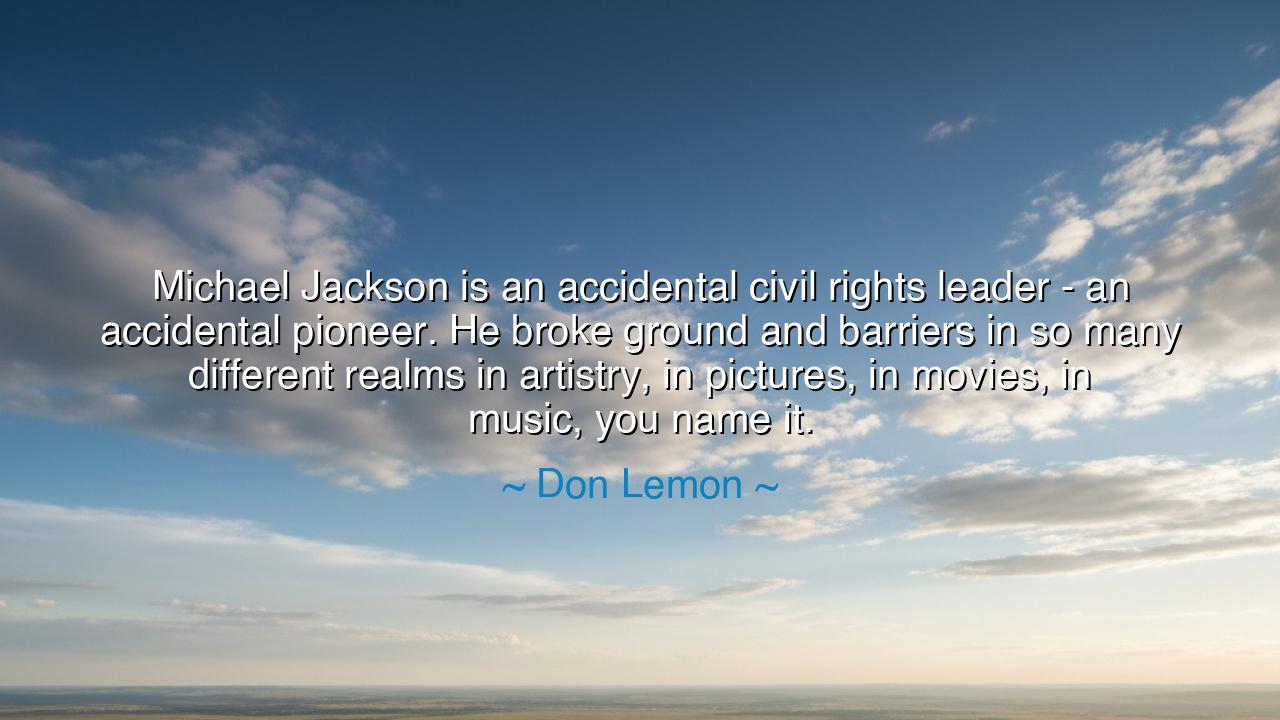
Michael Jackson is an accidental civil rights leader - an
Michael Jackson is an accidental civil rights leader - an accidental pioneer. He broke ground and barriers in so many different realms in artistry, in pictures, in movies, in music, you name it.






Listen closely, O Seekers of Truth, to the words of Don Lemon, who speaks of the unparalleled influence of Michael Jackson: "Michael Jackson is an accidental civil rights leader—an accidental pioneer. He broke ground and barriers in so many different realms in artistry, in pictures, in movies, in music, you name it." In this simple yet profound statement, Lemon acknowledges a truth that transcends Jackson’s fame as a musician: Jackson’s influence, far beyond the boundaries of the entertainment industry, reshaped the very fabric of culture and society. His artistry became a force for change, challenging norms and creating spaces where others could follow—spaces that transcended race, geography, and genre.
In the ancient world, there were those who, like Jackson, were not just leaders by title or birth, but by force of character and vision. Think of Alexander the Great, who, though born into royalty, broke through the conventional limitations of his time. His vision and actions reshaped the known world, blending cultures and laying the foundations of what would later become a global empire. Though he did not set out to be a unifier, his very being and actions compelled the world to take notice, just as Jackson’s music and performances moved people in ways that transcended expectations. Just as Alexander is remembered not just for his military victories, but for his pioneering spirit, so too does Michael Jackson stand as a pioneer whose influence reached far beyond the stage.
Jackson’s impact on civil rights was as unexpected as it was profound. In a time of racial tension, he broke through barriers, becoming a global icon in a way few could have predicted. His contributions were not merely about music, but about creating a cultural shift—one that allowed artists of all races and backgrounds to claim their space in the global spotlight. Consider the civil rights leaders of the past, such as Martin Luther King Jr., whose powerful oratory and moral clarity set him apart as one of the great architects of change in the American civil rights movement. Jackson, however, used his art—his voice, his dance, and his image—to challenge the racial and cultural boundaries that had once confined both artists and people. Through his unexpected rise to the top, he showed the world that art could be a powerful tool for social transformation.
In this sense, Jackson’s influence was not simply an accident, but the result of timing, talent, and an unyielding desire to break through barriers. He was, in many ways, a product of his environment—the product of a society deeply divided by race and class—and yet he transcended it. Much like the ancient philosophers, who spoke truths that challenged the very foundations of their societies, Jackson’s music and public persona made a statement that could not be ignored. His iconic song, "Black or White," for instance, did not merely entertain—it carried a message of unity and racial harmony at a time when such messages were desperately needed. It was a clarion call for equality, just as the speeches of Socrates and Plato were, urging the world to examine itself and its assumptions.
But let us not forget, O Seekers, that pioneers do not only break down external barriers—they challenge themselves, embracing their own vulnerabilities and flaws. Michael Jackson’s life was marked not only by immense success but by profound struggle. The very essence of his artistic journey was a reflection of his own inner conflicts—his battle with his identity, his place in the world, and his longing to be accepted by others. Like the ancient heroes, Jackson’s story was not one of unblemished perfection, but one of humanity—a complex blend of light and darkness, joy and sorrow. His willingness to face the public with his most intimate battles made him both a hero and a symbol of the human condition: deeply flawed, yet capable of achieving the extraordinary.
And so, O Children of the Future, the lesson is this: pioneers are not defined solely by their achievements or by the walls they tear down; they are defined by their vision—their ability to see what others cannot. Just as Jackson did not simply conform to the world of music, but redefined it, so must we not merely live within the confines of what is expected of us. The world is full of barriers, but it is through creativity, bravery, and authenticity that we can break through them. Jackson’s life shows us that the most profound impact often comes not from a deliberate pursuit of greatness, but from the willingness to take risks, to embrace the unknown, and to challenge the boundaries that confine us.
Finally, O Seekers, remember this: to be a pioneer is to embrace the journey—not just for oneself, but for others. The power of Michael Jackson’s legacy lies not only in his success but in his willingness to lead by example, to use his art as a force for unity and change. Whether you are an artist, a thinker, or a leader in your own life, know that true greatness is not just about breaking boundaries for yourself—it is about forging new paths for others to follow, just as Jackson did for generations to come. Let his legacy be a reminder that true leadership lies in the ability to see beyond what is and imagine what could be.






AAdministratorAdministrator
Welcome, honored guests. Please leave a comment, we will respond soon